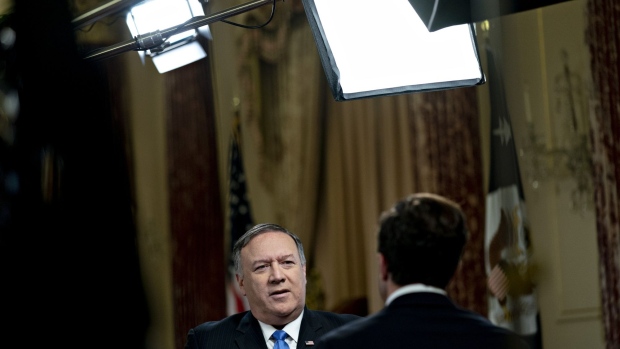Jul 26, 2019
Hong Kong Protests Become a Global Problem
, Bloomberg News

(Bloomberg) -- Tensions between Hong Kong and the government in Beijing are increasingly spilling outside China’s borders.
China’s foreign ministry this week accused the U.S. of being a “black hand” behind protests that have rocked Hong Kong since early June, while Secretary of State Michael Pompeo urged Beijing to “do the right thing.” An encounter at an Australian university between supporters and critics of the Hong Kong demonstrators ended with punches being thrown.
With no end to the protests in sight -- hundreds of people staged a sit-in at Asia’s busiest airport Friday -- the dispute over Hong Kong’s future risks dragging in parties from all over the world. That could include diplomats, tourists, universities and multinational businesses caught up in the territory’s tinderbox political climate.
For the Trump administration and the Communist Party in Beijing, the issue has become one of many flash points ranging from trade to technological dominance to corporate espionage. The debate over Hong Kong is getting more heated, just as U.S. negotiators prepare to restart trade talks next week in Shanghai.
There are “signs of foreign forces behind the protests,” Chinese Foreign Ministry spokeswoman Hua Chunying told reporters Tuesday in Beijing. “I wonder if these U.S. officials can truthfully answer to the world the role the U.S. has played in recent events in Hong Kong.”
The accusation of meddling was rebutted by Harvey Sernovitz, a spokesman for the U.S. consulate in Hong Kong.
“This is a ridiculous statement,” he said on Wednesday. “The ongoing demonstrations in Hong Kong reflect the sentiment of the people of Hong Kong and their broad concerns about the erosion of Hong Kong’s autonomy.”
Pompeo, who has slammed China in recent months for alleged abuses against the Uighur community in Xinjiang, urged all sides to avoid violence.
“The president, I think, captured it right when he said that we need China to do the right thing,” Pompeo told Bloomberg Television in an interview Thursday. “We hope that they’ll do that, we hope that the protests will remain peaceful.”
At the University of Queensland in Brisbane on Wednesday, rival groups faced off over the situation in Hong Kong, with one side singing pro-China songs and the other chanting “free Hong Kong.” Footage posted on Twitter showed protesters hurling verbal abuse as police tried to restore calm, while two people exchanged punches.
The Chinese consulate in Brisbane issued a statement Thursday praising students for staging “a voluntary patriotic rally in response to two consecutive anti-China and secessionist protests held at the university campus,” according to a website run by the Communist Party’s Global Times, a nationalistic tabloid.
Further Protests
For now, differences of opinion over Hong Kong haven’t prevented China from cooperating with its critics on other issues.
Boris Johnson, the U.K.’s new prime minister, told Phoenix Television in an interview that his country was “very pro China.” Chinese Premier Li Keqiang told Johnson in a congratulatory letter that he’s willing to expand bilateral cooperation in all sectors and push for steady development in a “golden era” of ties, according to a the official Xinhua News Agency.
The warm words came less than a month after officials from the two countries openly accused each other of behaving inappropriately toward Hong Kong, which was a British colony before its handover to China in 1997.
More opportunities for tensions to escalate could come as soon as this weekend. Protest groups are seeking to hold a demonstration on Saturday in the same area where unidentified groups of men attacked people at a train station in the northwestern suburb of Yuen Long on July 21. Hong Kong police have withheld approval for the protest, but organizers insist they’ll go ahead.
To contact the reporter on this story: Enda Curran in Hong Kong at ecurran8@bloomberg.net
To contact the editors responsible for this story: Tracy Alloway at talloway@bloomberg.net, Michael Patterson
©2019 Bloomberg L.P.







